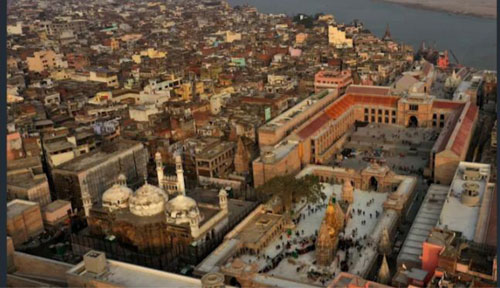For nearly three centuries, Muslims and Hindus in India’s northern Varanasi city have prayed to their gods in a mosque and a temple that are separated by one wall. Many see it as an example of religious coexistence in a country where bouts of deadly communal violence are common.
That coexistence is now under threat due to a controversial court case. A local court earlier this month began hearing a petition filed by a group of Hindus that seeks access to pray inside the Gyanvapi mosque compound, arguing it was built on top of the ruins of a medieval-era temple that was razed by a Mughal emperor. The petitioners say the complex still houses Hindu idols and motifs, a claim that has been contested by the mosque’s authorities.
The legal battle is the latest instance of a growing phenomenon in which Hindu groups petition courts demanding land they claim belongs to Hindus. Critics say such cases spark fears over the status of religious places for India’s Muslims, a minority community that has come under attack in recent years by Hindu nationalists who seek to turn officially secular India into an avowedly Hindu nation.
“The idea to bombard the courts with so many petitions is to keep the Muslims in check and the communal pot simmering,” said Nilanjan Muk-hopadhyay, a political analyst and commentator. “It is a way to tell Muslims that their public display of faith in India is no more accepted and that the alleged humiliation heaped on them by Muslim rulers of the medieval past should be redressed now.”
The court case involving the 17th century Gy-anvapi mosque in Varanasi, one of Hinduism’s holi-est cities, in many ways embodies India’s contem-porary religious strife. The widely accepted consen-sus among historians is that it was built on top of a temple dedicated to the Hindu god Shiva after it was demolished by the Mughal ruler Aurangzeb.
The two communities have in the past stuck to their claims but also made sure the dispute didn’t worsen. That changed last week when a local court in Varanasi ordered the mosque to be surveyed after five Hindu women filed a petition seeking permission to offer prayers there.
A video survey found a stone shaft alleged to be a symbol of Shiva inside a reservoir in the mosque used by Muslim devotees for ablution before offering prayers, according to Hari Shankar Jain, a lawyer representing the Hindu women.
“The land on which the mosque is built belongs to Hindus and should be returned to us,” Jain said. Mosque representatives have refuted the claims. Rais Ahmad Ansari, a lawyer for the mosque’s committee, said the alleged stone shaft found in the reservoir was the base of a fountain.—AP










